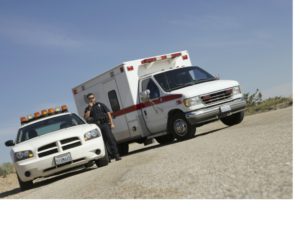Is fear a denial of faith? If we’re scared or apprehensive about a career move, returning to school, a relationship, refusing to work on the Sabbath, returning a faithful tithe, etc., does that dry mouth and upset stomach indicate that we’re not trusting God?
I don’t think so.
Fear is an emotion, a feeling. As an emotion, it carries no morality or judgment. But the actions we take in response to the emotion of fear can have moral or spiritual implications.
In contrast to fear, faith is not an emotion, but an action. Faith is a willful choice to trust God despite the feelings of fear associated with that choice. I want to submit two biblical examples to prove this point.
The Red Sea Crossing. According to Exodus 14:10, the Israelites “were terrified and cried out to the Lord” when they saw the Egyptian army bearing down on them. They were trapped with seemingly no way out. “Moses stretched out his hand over the sea, and all that night the Lord drove the sea back with a strong east wind and turned it into dry land. The waters were divided, and the Israelites went through the sea on dry ground, with a wall of water on their right and on their left” (Ex. 14:21, 22).
The writer of Hebrews has this to say about that dramatic crossing: “By faith the people passed through the Red Sea as on dry land…” (Heb. 11:29). There is no mention of the emotions gripping the people as they crossed, is there? Were the Israelites terrified as they went down into the sea with a wall of roiling water towering above them to their left and right? As the sound of wind and water mixed with the shriek of infants and animals, and the shouts and prayers of fleeing captives, were hearts pounding? Was adrenaline pumping? Were eyes wide with fright? The Bible doesn’t say.
And that’s the point. The Bible doesn’t mention it because how they were feeling as they crossed didn’t matter. What matters is they crossed! They followed God’s command to cross regardless of their fears. Faith was evidenced by the actions taken despite their feelings. And faith is what pleases God.
Rebellion at Kadesh. We see another confrontation between fear and faith when Israel reached the borders of Canaan—the land of promise. Occupation of Canaan was the whole purpose of the Exodus. God delivered Israel from Egypt so He could establish them as a free people in Canaan.
But 10 of 12 spies came back with the report that there were giants in the land (Numbers 13:32, 33) and therefore, they couldn’t succeed. Fear and anger immediately gripped the people. All night the people “raised their voices and wept aloud” (Num. 14:1).
But the actions at Kadesh differed greatly from the actions at the Red Sea. Instead of obeying God despite their fears, they obeyed their fears despite the promise of God. The same writer of Hebrews has this commentary concerning the rebellion: “Who were they who heard and rebelled? Were not all those Moses led out of Egypt? And with whom was he angry for forty years? Was it not with those who sinned, whose bodies fell in the desert? And to whom did God swear that they would never enter his rest if not to those who disobeyed? So we see that they were not able to enter, because of their unbelief” (Heb. 3:16-19). About faith the writer continues, “For we also have had the gospel preached to us, just as they did; but the message they heard was of no value to them, because those who heard did not combine it with faith” (Heb. 4:2).
At the Red Sea, they trusted God despite their fears and crossed over to safety. At Kadesh, they distrusted God, gave in to their fears, and did not cross over to their inheritance. At the Red Sea, what mattered was their action, and it was counted as faith. At Kadesh, what mattered again was their action, and they “did not combine it with faith.” The emotion of fear is not what counts; it’s what you do despite your fear that counts.
Consider Jesus who sweat blood in the Garden of Gethsemane. Did fear wash over Jesus that awesome night? “As Christ felt His unity with the Father broken up, He feared that in His human nature He would be unable to endure the coming conflict with the powers of darkness….With the issues of the conflict before Him, Christ’s soul was filled with dread of separation from God….Again the Son of God was seized with superhuman agony, and fainting and exhausted, He staggered back to the place of His former struggle. His suffering was even greater than before. As the agony of soul came upon Him, “His sweat was as it were great drops of blood falling down to the ground”….Turning away, Jesus sought again His retreat, and fell prostrate, overcome by the horror of a great darkness. The humanity of the Son of God trembled in that trying hour. He prayed not now for His disciples that their faith might not fail, but for His own tempted, agonized soul. The awful moment had come—that moment which was to decide the destiny of the world. The fate of humanity trembled in the balance. Christ might even now refuse to drink the cup apportioned to guilty man.” (DA, 686, 689, 690)
But, Halellujah! He didn’t refuse to drink it. Despite the fear, the dread, the agony and horror, Jesus put His trust in the Father and accepted the cup. “Yet not my will, but yours be done” (Luke 22:42). This is the essence of faith—acting in obedience to the will of God despite your fears.
The emotion of fear is not what counts; it’s what you do despite your fear that counts. Do not worry that if you feel scared you are denying faith. Worry only if, like Israel at Kadesh, you allow your fears to cause you to act contrary to what you know to be the will of God.




